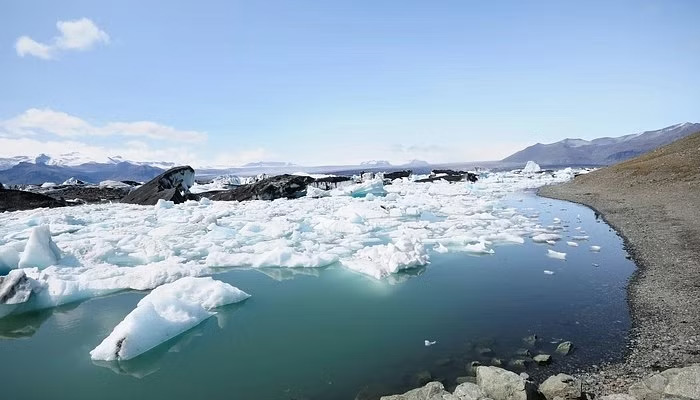The effects of Russia’s invasion of Ukraine — beyond the tragedies that any war brings — have been felt around the world, through volatile food prices and energy insecurity.
But a study published in Nature reveals another effect of the conflict that may otherwise slip under most of our radars: an enormous blind spot in one of our most vulnerable regions to climate change.
The Arctic is warming nearly four times faster than the rest of the planet. What happens there will be felt everywhere else. Thanks in part to the albedo effect, in which light surfaces reflect sunlight, the polar regions have a cooling effect on the planet.
As the Arctic loses snow and ice and gains plant life at higher latitudes, it’s absorbing more heat, contributing to global temperature increases and sea-level rise.
With huge amounts of carbon stored in the Arctic — the permafrost alone holds an estimated 1,700 billion metric tons of carbon — it’s imperative that we understand what’s happening while acting to protect it.
Since early 2022, just after Russia invaded Ukraine, collaborations between Russian institutions and Western organisations such as the International Network for Terrestrial Research and Monitoring in the Arctic (INTERACT), which is the most extensive network of research stations in the Northern Hemisphere and funded by the European Union, have been put on hold.
That means many studies are on hiatus and that vital data from a huge area are inaccessible or potentially not being collected. For context, 53 per cent of Arctic coastline is in Russia.
Efrén Lopéz-Blanco, Lead Author of the paper and a researcher in the Department of EcoScience at Aarhus University in Denmark, said stations in the INTERACT network, including those in Russia, are biased toward warmer, wetter locations with deeper snowpacks, lower vegetation biomass and less soil carbon than the Arctic region as a whole.
The exclusion of Russian stations from the INTERACT network increases that bias markedly, decreasing researchers’ ability to accurately describe changes in the region.
Out of the INTERACT sites, half of those located in a boreal forest zone are in Russia. The loss of Siberian stations capturing taiga forest could be detrimental to tracking processes that would have global consequences; for instance, permafrost thawing and changes in biodiversity can all affect the carbon balance — how much of it is being absorbed versus how much is being released.
As a huge area under the jurisdiction of multiple nations, the Arctic is and always has been a flashpoint for territorial disputes. But it’s not just there where multi-governmental conflict is hampering our ability to monitor changes.
Like the Arctic, oceans are so large and interconnected that one can only really ever understand them by working together, as Matt Frost, head of research organization Plymouth Marine Laboratory’s international office tells me.
This makes international collaboration and partnerships key. But marine scientists are increasingly encountering obstacles — from which names to use (is it the Falkland Islands or the Islas Malvinas?); boundary quarrels (about 39 per cent of the 460 maritime borders are in dispute); and the breakdown in working relationships because of sanctions, which limits access to research vessels and data.
These don’t just add burdens on researchers, but risk our oversight of the planet. Global data sharing is essential to determine whether local variables or climate change are responsible for events such as fish population shifts.
We’ve been in something of a golden era of global scientific collaboration: One analysis of more than 10 million studies found that the number of internationally co-authored papers rose to 21.3 per cent from 10.7 per cent between 2000 and 2015. But we appear to be entering a new era where geopolitics increasingly makes open scientific cooperation harder, concerning many researchers.
It’s important that we seek strong responses to aggressors like Russia and others. But it’s also true that a challenge such as the climate crisis can’t be properly addressed without international partnerships.
In an increasingly fractious world, the question is whether it’s possible to separate science from power dynamics and geopolitical tensions.

